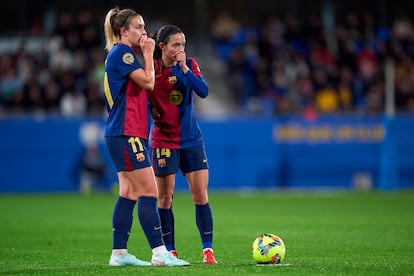Barcelona - Arsenal: The reigning king of Europe faces a historic club returning to the Champions League final.


At the start of the season, all the predictions were that Barcelona, the current European dominators (three Champions League titles out of the last four), would be in the Champions League final this Saturday at the Estádio José Alvalade in Lisbon (6:00 p.m.; Dazn, La1 and Movistar), but almost no one expected their opponent to be Mariona Caldentey's Arsenal. The Gunners lifted the big-eared trophy in 2007, when the tournament was still called the UEFA Women's Cup, but in the last 11 seasons they have missed out on seven occasions in the continent's biggest club competition. The team has progressed under the guidance of the Spanish player—voted best player in her first season in England—, coach Renée Slegers—who arrived on the bench in October—and a sustained investment in the women's team since the section became professional a decade ago, but today's duel , at first glance, looks uneven between a team that has reached six of the last seven finals and another that is returning to the European elite. "It may be normal for us to be labeled as favorites because of everything we've done in recent years, but for us it's not an easy match and we don't take it for granted," explained Aitana Bonmatí, the current Ballon d'Or winner, at a press conference in the Portuguese capital on Friday.
Barcelona's dominance in Europe has been underscored in recent years by the number of titles they've won, but in Spain it's overwhelming: since the 2018-19 season, the Blaugrana have lost only six matches and drawn six of their 205 La Liga appearances. Barça have won 93.5% of their matches in all competitions, while Arsenal have triumphed 68% of the time. In these last seven seasons, the Gunners have lost 23 matches and drawn 14 of their 145 matches in the Women's Super League. The difference between the two teams is partly due to the level of their domestic competitions.
The overwhelming number of victories is also reflected in the number of goals scored and conceded by each team. Since the 2018-2019 season, Barcelona has scored 1,244 goals in 307 matches across all competitions—4.05 per game—while Arsenal has tallied 689 in 245 matches—an average of 2.81. In the Champions League, the difference this season is also significant: the Blaugrana have scored 44 times and conceded 7, while the Gunners have scored 36 goals and conceded 15.
Barça's goal-scoring prowess has taken a step forward this year. The young striker, 23 years old, has 10 goals and is the top scorer in the Champions League. The player from Montcada i Reixac is having her best season yet. She has taken advantage of both Mariona's departure last June and Salma Paralluelo's absence between late August and mid-December. Caldentey and Alessia Russo, one of the best strikers in Europe, are second in the table with seven goals, one more than Ewa Pajor, Barça's great signing last summer and top scorer in the F1 League (25). Barcelona's goal-scoring prowess is so formidable that Salma herself (4) and Aitana (4) also appear among the tournament's top scorers.
Barcelona makes a difference with its midfield, where this year a trident has returned that last started in a Champions League final in 2022: Aitana Bonmatí at right midfield, Patri Guijarro at pivot, and Alexia Putellas at left midfield. Keira Walsh's departure and Alexia's improved form have reshaped this formation, popularized as APA, driven by Patri, who is instrumental in organizing the ball out. "Patri is essential; she helps us play well. She makes Aitana and Alexia generate their best football," Pere Romeu shared yesterday. With them in the engine room, Barcelona excels in the Champions League in almost every offensive statistic, surpassing all other teams. The Blaugrana have moved the ball the most throughout the competition—72% of the time—above Bayern Munich and Arsenal—both with 61%. They are also the most accurate in passing—89%, compared to 84% for the Gunners —and the ones who shoot the most on goal—23.3 times per game, compared to 13.3 for their opponents.
Defensively, Barcelona is also one of the most prominent teams, with Irene Paredes and Mapi León as a reliable tandem in the center of defense. They have only conceded seven goals in the entire tournament this season and are the team that presses the furthest from their own goal to win back possession. The Blaugrana attempt to steal possession 55.92 meters from Cata Coll's goal, while Arsenal—who have conceded 15 goals—do so 47.56 meters from their keeper. The Gunners engage in more aggressive actions than Barça—91.2 to 73.9—after losing control of the ball, but this is also because the Catalans have much more possession than their opponents and don't need to steal it as often as the English team.
According to the specialist website soccerdonna , Barcelona's squad is the most valuable in Europe at €6 million, well above Arsenal's (€4.2 million), which also has Chelsea (€5.2 million), Olympique Lyonnais (€4.7 million), and Bayern Munich (€4.4 million). Barça, in fact, plays its 100th Champions League match this Saturday in the final. The first in its history was against the Gunners in 2012, when they lost 7-0 on aggregate. Thirteen years later, the club's other Ballon d'Or winner, Alexia, is the only player left from that squad. "Everything leads you to be what you really are today. In that first match, it was unthinkable to imagine everything that has come after," the captain shared yesterday. Aitana summed it up simply: "Now we are the team to beat."
EL PAÍS





